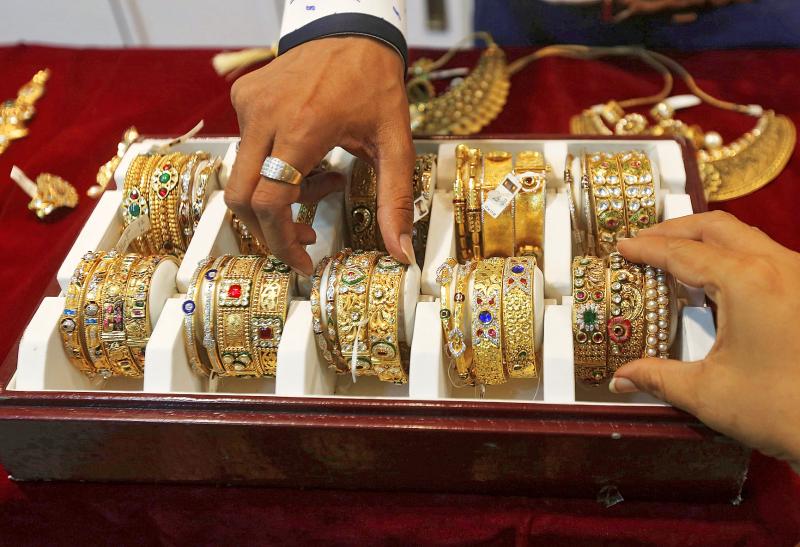Indian consumers are ratcheting up buy-now, pay-later (BNPL) installment plans to purchase everything from washing machines to vacations online as the nation’s longest festive season gets under way.
Popularity is swelling for these small-sized loans that typically amount to less than 5,000 rupees (US$67) as the labor market recovers from the COVID-19 pandemic shock. Those payments have been growing at least 20 to 30 percent over the past three months, fintech-firm executives said.
They are expected to increase by about 66 percent on an annual basis in India to US$11.6 billion this year, a survey by Research and Markets showed.

Photo: Reuters
“Things are very positive, people have got their jobs back,” said Bhavin Patel, cofounder and CEO of LenDenClub, a peer-to-peer lending platform. “The buy-now, pay-later model is the most popular source of borrowing for customers who need small size loans quickly to tide over immediate cash needs.”
Rising vaccination rates, coupled with decreasing COVID-19 cases, are fueling optimism that people are more willing to spend on goods and jewelry this year. Those consumers are increasingly turning to installment plans from retailers such as e-commerce giants Amazon.com Inc, Flipkart Internet Pvt Ltd and Ant Group Co (螞蟻集團) backed Paytm Ecommerce Pvt, as well as smaller fintech firms like LenDenClub, Simpl, ZestMoney and CASHe.
LenDen has seen loan applications treble to 170,000 last month from February and expects a further increase to 250,000 in December, Patel said.
More broadly, spending per credit card was up 54 percent in August from a year earlier, a Bank of America Corp report showed.
“BNPL is aided by two things, one is the festive season and second is COVID as people are becoming more comfortable with purchasing online,” CASHe chief executive Yogi Sadana said. “We are growing about 30 to 35 percent on a monthly basis, in terms of the number of loans we provide every month. The pick-up is phenomenal.”
For fintechs, such loans are filling a sweet spot. They cater to customers who typically would not either qualify to borrow from a traditional bank or would have to wait longer than getting a loan within a few hours.
“It’s a win-win for all three players — the borrowers who get loans quickly, the lenders who earn 10 to 12 percent average returns and us who earn a 5 to 6 percent fee by getting the borrowers and lenders on a common platform,” Patel said.

Intel Corp chief executive officer Lip-Bu Tan (陳立武) is expected to meet with Taiwanese suppliers next month in conjunction with the opening of the Computex Taipei trade show, supply chain sources said on Monday. The visit, the first for Tan to Taiwan since assuming his new post last month, would be aimed at enhancing Intel’s ties with suppliers in Taiwan as he attempts to help turn around the struggling US chipmaker, the sources said. Tan is to hold a banquet to celebrate Intel’s 40-year presence in Taiwan before Computex opens on May 20 and invite dozens of Taiwanese suppliers to exchange views

Application-specific integrated circuit designer Faraday Technology Corp (智原) yesterday said that although revenue this quarter would decline 30 percent from last quarter, it retained its full-year forecast of revenue growth of 100 percent. The company attributed the quarterly drop to a slowdown in customers’ production of chips using Faraday’s advanced packaging technology. The company is still confident about its revenue growth this year, given its strong “design-win” — or the projects it won to help customers design their chips, Faraday president Steve Wang (王國雍) told an online earnings conference. “The design-win this year is better than we expected. We believe we will win

Chizuko Kimura has become the first female sushi chef in the world to win a Michelin star, fulfilling a promise she made to her dying husband to continue his legacy. The 54-year-old Japanese chef regained the Michelin star her late husband, Shunei Kimura, won three years ago for their Sushi Shunei restaurant in Paris. For Shunei Kimura, the star was a dream come true. However, the joy was short-lived. He died from cancer just three months later in June 2022. He was 65. The following year, the restaurant in the heart of Montmartre lost its star rating. Chizuko Kimura insisted that the new star is still down

While China’s leaders use their economic and political might to fight US President Donald Trump’s trade war “to the end,” its army of social media soldiers are embarking on a more humorous campaign online. Trump’s tariff blitz has seen Washington and Beijing impose eye-watering duties on imports from the other, fanning a standoff between the economic superpowers that has sparked global recession fears and sent markets into a tailspin. Trump says his policy is a response to years of being “ripped off” by other countries and aims to bring manufacturing to the US, forcing companies to employ US workers. However, China’s online warriors